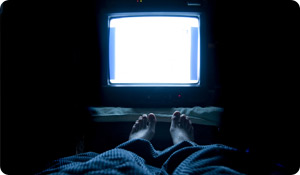
Watching the tube before bed may seem like a good way to wind down for the evening to help you relax and fall asleep. And according to Dr. Helene M. Emsellem, author of Snooze...Or Lose, this may be true. But only if you watch TV for a very short period of time, keeping the sound low, and viewing something that's nonviolent and non-stimulating. Watching an exciting, full-length movie in bed is more likely to keep you awake than lull you to sleep.
Even under the best of circumstances, most sleep experts do not recommend keeping a TV in the bedroom. This is because watching TV can be too stimulating for those who routinely suffer from sleep trouble. Many also believe that the glow of light that comes from a TV screen interrupts the natural rhythms the body counts on to help you fall asleep and wake up at an appropriate time. When you watch television in bed, your body can't get the important message that the bed is a place reserved just for sleeping. And when you are in the habit of doing other things in bed besides sleep, your body can't fall right to sleep.
According to a study performed by the Department of Psychiatry at Columbia University and the New York State Psychiatric Institute Sleep, problems related to television can start early in life and a key time to limit TV viewing before bed to prevent future sleep problems is during adolescence. The study, published in a 2004 issue of Archives of Pediatrics & Adolescent Medicine, found that 14- to 16-year-olds who watched three or more hours of television a day were at a much higher risk of developing sleep problems by the time they reach early adulthood. But the teens who reduced their TV viewing to less than an hour a day had developed fewer sleep problems when interviewed in their early 20's.
If you feel you must have some form of electronic media turned on right before you go to sleep, and you're not able to turn off the television off after a few minutes, experts at the University of Maryland Medical Center's Sleep Disorder Center suggest switching to a radio, which is much less engaging than TV. Listening to music on the radio before bed can relax you and distract your mind. It's as effective as TV, but less likely to keep you awake.
Sources:
Emsellem, H. "Snooze...or Lose!" (2006: The National Academies Press) Web 21 Nov 2011
http://www.nap.edu/openbook.php?record_id=11633&page=204
Johnson JG, et al. "Association Between Television Viewing and Sleep Problems During Adolescence and Adulthood." Archives of Pediatrics & Adolescent Medicine 2004 Jun;158(6):562-8. Web 21 Nov 2011
http://www.ncbi.nlm.nih.gov/pubmed/15184220
University of Maryland Medical Center: Sleep Disorders Center-A Word About Television Web 21 Nov 2011
http://www.umm.edu/sleep/sleep_hyg.htm#e
University of Utah Health Care: Using Electronics Before Bed May Hamper Sleep Web 21 Nov 2011
http://healthcare.utah.edu/healthlibrary/related/doc.php?type=6&id=650536





